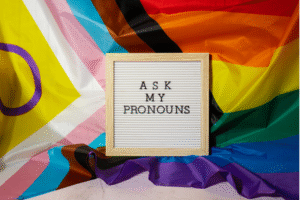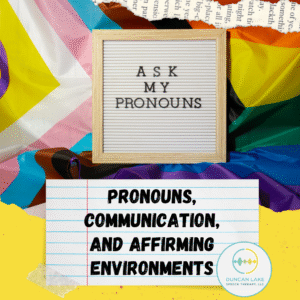by Tamiko Teshima, M.A., CCC-SLP
Practice Owner & Speech-Language Pathologist
Duncan Lake Speech Therapy, LLC
At Duncan Lake Speech Therapy, we believe that communication is about connection, and we know that connection starts with respect. One of the simplest and most powerful ways to show respect is by honoring someone’s pronouns.
While pronouns may seem like a small part of language, they carry big meaning. Using someone’s correct pronouns affirms their identity, builds trust, and signals that they belong. For children and adults alike, this can make all the difference, especially in environments where they’re learning, growing, and healing.
So how do we help make home, school, and therapy spaces more affirming through communication? Here are some tips to start!

At Home
- Model inclusive language. Practice sharing your pronouns (“Hi, I’m Tami, and I use she/her pronouns”) to normalize the practice for your kids.
- Make space for exploration. It’s okay for children (and adults!) to try out different pronouns or names. Support curiosity with openness rather than pressure.
- Correct (and accept correction) gently. If someone makes a mistake, calmly model the correct pronoun and move on. Overreacting can create shame or make someone afraid to try again. Likewise, if you make a mistake, correct yourself and move one. Overreacting puts the responsibility of managing your feelings on the person whose pronouns were used incorrectly.
At School
- Advocate for inclusive policies. Ask how your child’s school handles name and pronoun changes, and whether students are supported if they come out.
- Use inclusive materials. Books, classroom visuals, and lessons that reflect gender diversity help all kids feel seen and teach empathy. One resource we often use for inclusive books is MaiStoryBook!
- Talk to teachers. If your child uses a name or pronouns that differ from their school records, let educators know what language to use and how to support your child
In Therapy
- Start with the client’s identity. Ask clients what name and pronouns they’d like us to use. Don’t assume.
- Use intake forms wisely. Inclusive intake forms ask about pronouns, gender identity, and how clients would like to be addressed, without forcing binary choices. Therapy practices, if you’re looking for help with forms, please contact AC Goldberg at Transplaining. He will help you modify your paperwork to make it more inclusive!
- Affirm through practice. If a client is exploring their identity, pronouns, or voice, we support them through both clinical expertise and human connection.
Pronouns are more than grammar. They’re a gateway to belonging. Whether you’re raising kids, teaching students, or providing care, you can help create a space where everyone is seen and respected for who they are.



Recent Comments